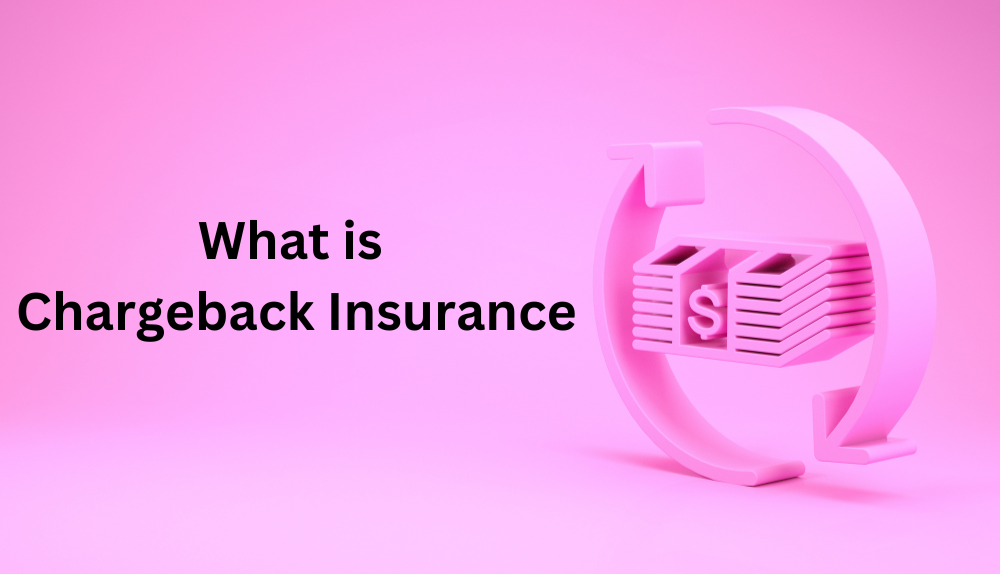
By max May 12, 2023
Running your own store carries risk. A break-in, for instance, can result in a huge loss for your company. Likewise, a fire break-out can result in the loss of property and lives. To protect the business from such accidents, merchants apply for chargeback insurance that covers possible damages.
Chargeback insurance is the same, except it’s for merchants that accept card-not-present transactions. With card-not-present fraud on the rise, chargeback insurance has become an important part of your coverage, more now than ever. Note that chargeback insurance does not prevent chargebacks, but reimburses the losses you have incurred from the chargeback requests.
If you are wondering what chargeback insurance is and how it protects your business from loss, you are in the right place. We’ve shared a detailed guide on chargeback insurance, its importance, the reasons a merchant needs it, and more. Let’s take a look.
What is Chargeback Insurance?
To understand merchant chargeback insurance, you need to understand the chargeback process and how it works. A chargeback request is issued by the cardholder who believes that a certain transaction on their credit card statement is unauthorized. In other words, if a cardholder notices an unrecognized transaction or is unsatisfied with the product delivery, they might issue a chargeback.

The issuing bank reviews their request and reverses the transaction if it seems accurate. The amount is debited from the merchant’s account. The merchant can fight the chargeback or pay back the transferred amount, depending on the transaction’s authenticity. A high chargeback ratio can put the merchant’s account at risk of termination.
The chargeback requests can sometimes be a friendly fraud, in which the customer requests a chargeback for the transaction they have made. They claim that the transaction was unauthorized, asking the issuing bank to reverse the transaction. While the merchant has the option to fight such requests, it deducts a small percentage of the chargeback fee from their accounts.
Chargeback insurance protects merchants from such issues. The insurer reimburses the merchant for the amount they lost in chargebacks. The fee policy may vary greatly from one insurance company to another, although it’s mostly a percentage of the fee on each sale. Or, the merchant might charge a fixed fee monthly. Before you consider chargeback insurance, know that some insurers put restrictions on the amount, type of chargebacks, and other factors. It’s, therefore, important to go over the coverage carefully.
How Does Chargeback Insurance Work?
Chargeback insurance might work differently depending on the insurance provider you choose and the coverage they offer. Go through the policy to learn about basics, like premiums, types of chargeback disputes covered, and so on. Here’s a brief overview of how most chargebacks work.
Select an Insurance Provider
You will find many insurance providers offering chargeback insurance, but before that, check with the payment processor to know if they offer insurance policies. Some fraud detection and prevention companies offer chargeback insurance as an add-on. It’s better to buy insurance from a payment processor than to work with a new insurance company.
Buy the Insurance
Before buying, you need to go through the insurance policy thoroughly to know what’s covered and what’s not. Remember, your reimbursement request won’t be accepted if a certain type of chargeback is not covered in the policy. Knowing the terms of the policy beforehand is important.
As mentioned earlier, the chargeback policy could vary from vendor to vendor. Some might offer coverage for card-not-present transactions only, while others may only accept your chargeback request if it’s processed through specific gateways or payment processors. Mostly, insurance providers accept reputable and secure payment processors that detect and prevent fraudulent transactions. In addition, the company might put a limitation on the number of chargeback reimbursement you can claim monthly.
Fraud Detection
Some chargeback insurance providers offer an integrated fraud detection program that scans each sale for scams. The transaction is declined straight away if it’s suspected to be a fraud. This is a highly recommended feature for merchants accepting card-not-present transactions, as it adds another layer of protection for your business.
Get Reimbursement
If you receive a chargeback from a customer, you can claim a reimbursement from the insurance company. Whether it pays the full amount in question or the amount equal to the chargeback fees depends on the insurance policy.
What Coverage Do You Get From Chargeback Insurance?
Chargeback insurance offers some level of security to the merchant, but they don’t cover all types of chargeback requests. For instance, a chargeback that’s issued because of a suspected fraudulent transaction will most likely be covered in the policy. But if it’s issued by a customer for not receiving the product or services that the merchant promised, the insurance provider won’t accept the reimbursement request. This leads us to a question, what is excluded from the chargeback insurance?
Chargebacks that occur because of a mistake from the merchant’s end or anything that’s not included in the coverage policy can’t be reimbursed. Here’s what the chargeback insurance policies exclude generally.
- Not delivering the product/services as promised
- Damaged product
- Selling products to international countries or areas associated with high risk
These are the most common items excluded from the chargeback insurance policies. But based on the vendor you choose, they might restrict chargebacks for other reasons, such as failure to prove the product delivery. This clarifies that chargeback insurance offers protection to the merchants, but they don’t cover them for all chargeback requests.
Reviewing the policy will help you avoid signing up for a plan that doesn’t meet your goals. Moreover, merchants must follow PCI DSS compliance, evaluate each transaction for fraud, and resolve customer disputes before they reach the chargeback stage. Taking precautions from your end is the best way to achieve customer satisfaction and prevent revenue loss.
When Do You Need Chargeback Insurance?
The decision of buying chargeback insurance can be pretty overwhelming for a merchant. There’s a possibility that you might end up paying an exorbitant fee for each transaction or a high premium every month. Likewise, there’s a risk you might get several chargeback requests, resulting in a loss of revenue. Some insurance providers offer limited coverage, which means the merchant can only recover the amount for chargeback requests that meet the terms of the policy.
Whether you need chargeback insurance or not depends on the usual size of the transactions, sale volume, and the type of transactions processed at your store (card-not-present or online transaction).
The good news is many reputable merchant service providers offer chargeback for an additional cost and many add-ons for free or a small price. For instance, PayPal costs 0.40% of the transaction for its cashback insurance premium. It protects merchants from fraud as long as the items are shipped within the US. Shopify also offers chargeback protection for all fraudulent chargebacks.
Drawbacks of Chargeback Insurance
Chargeback insurance is a highly-effective and advanced tool for businesses exposed to fraudulent transactions. Anyone can misuse a stolen credit card to process an unauthorized transaction at your store (online or land-based). A customer will issue a chargeback request if they notice such transactions on their credit card statements, reversing the transaction and returning the amount to the customer.

With chargeback insurance, you can have peace of mind knowing that the insurer will reimburse you for the loss from such issues. That said, insurance doesn’t guarantee the best protection for all fraudulent transactions. It’s advisable to use it in conjunction with other fraud detection tools to minimize the risk of fraud and maximize your returns.
Here are a few things to consider when deciding whether to buy chargeback insurance or not.
- Chargeback insurance is an additional expense for businesses. They offer limited coverage and charge a fixed percentage of the fee on each sale.
- It can lead to unsatisfied customers. An insurance provider will take every step to ensure limited chargebacks for the business. They might implement a fraud detection program and require the merchant to use filters for identifying and declining fraud transactions. Sometimes, this can reject legitimate payments, resulting in frustrated customers and lost revenue for the business.
- Chargebacks might reduce the financial loss your business experiences from fraudulent chargebacks, but it doesn’t always prevent fraudulent transactions. Besides that, it doesn’t cover chargebacks that happen due to the merchant’s mistake. For example, failure to deliver the product on time or as promised can lead to a chargeback which won’t be covered in the insurance policy.
It’s advisable to compare the premium cost with the amount you can save before buying the chargeback insurance. It’s also important to work with a professional and reputable vendor to get the best policy with advanced fraud detection tools.
Conclusion
Have you ever sold a large volume of products only to discover that you’ve incurred a huge revenue loss due to the chargebacks? Whether these are caused by friendly-fraud practices or authentic reasons, monitoring the chargebacks and taking measures to prevent them is key to ensuring smooth business operations. Buying chargeback insurance can help here, but you must weigh the pros and cons before signing the deal.
